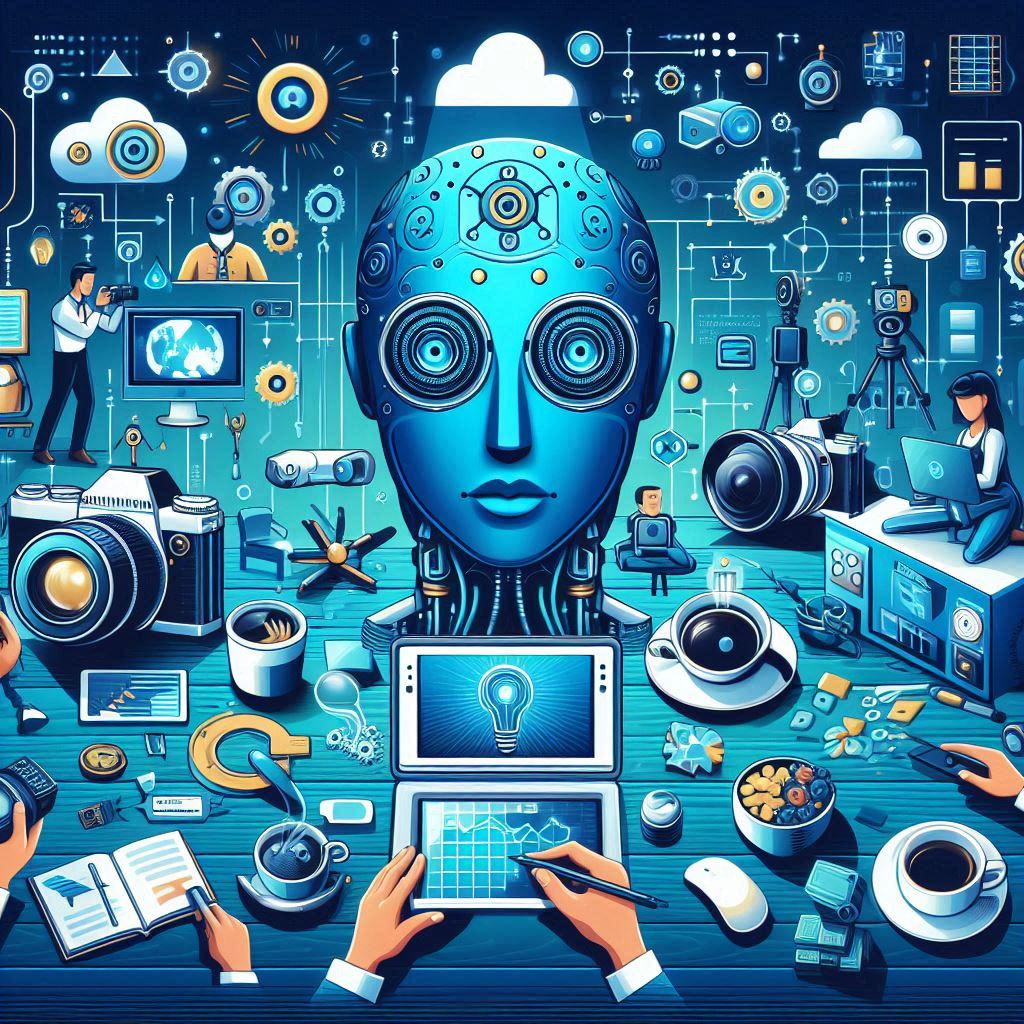In today’s fast-paced digital landscape, businesses are constantly seeking innovative ways to enhance their marketing efforts and stay ahead of the competition. Artificial Intelligence (AI) is revolutionizing the marketing industry, enabling businesses to improve campaign efficiency, increase ROI, and better connect with their target audience. From personalized recommendations to automating repetitive tasks, AI is transforming how marketing campaigns are planned, executed, and measured. In this article, we will explore how you can leverage AI tools in digital marketing to improve your campaign efficiency and achieve better results.
What Is AI in Digital Marketing?
AI in digital marketing refers to the use of machine learning algorithms, data analysis, and automation technologies to optimize marketing strategies. AI helps marketers understand customer behavior, predict trends, and automate repetitive tasks, making it easier to deliver personalized experiences. Whether it’s chatbots providing instant customer service, predictive analytics for future trends, or personalized email campaigns, AI tools have become integral to modern digital marketing.
Why AI is Crucial for Digital Marketing?
As consumer expectations grow, brands need to deliver highly relevant, timely, and personalized content to their audience. AI enables marketers to:
- Analyze customer behavior: AI tools can track and analyze vast amounts of data, providing insights into customer preferences, buying behavior, and trends.
- Automate repetitive tasks: AI can take over time-consuming tasks like scheduling posts, sending follow-up emails, and even writing content.
- Personalize user experiences: AI can help create more targeted ads, personalized emails, and unique content, improving engagement and conversion rates.
- Predict future trends: Using predictive analytics, marketers can anticipate customer needs, optimize campaigns, and allocate resources more efficiently.
How AI Tools Improve Campaign Efficiency?
AI-Powered Personalization
Personalization is key to the success of any digital marketing campaign. AI enables hyper-personalization, where marketers can tailor content, recommendations, and offers based on individual preferences and behavior. By analyzing data such as browsing history, social media interactions, and past purchases, AI tools can create unique customer experiences. For example:
- Dynamic content: AI tools like Persado and Dynamic Yield allow marketers to dynamically change website content based on the visitor’s profile or behavior.
- Email personalization: Tools like Mailchimp use AI to segment email lists and personalize subject lines, improving open and click-through rates.
Personalized marketing not only improves customer satisfaction but also boosts conversion rates. According to a study by McKinsey, businesses that personalize their marketing efforts see up to a 15% increase in revenue.
Chatbots for Customer Engagement
AI-powered chatbots have become a staple in customer service and engagement strategies. These bots use natural language processing (NLP) to understand and respond to customer queries, offering real-time assistance. Chatbots enhance campaign efficiency by:
- Providing instant customer support: Bots like Drift and HubSpot are available 24/7, offering immediate assistance to customers, which reduces wait times and improves satisfaction.
- Automating lead generation: Chatbots can gather information about visitors and qualify leads without human intervention, improving the efficiency of marketing and sales teams.
- Driving engagement: By engaging users in interactive conversations, chatbots help increase dwell time on websites and improve customer retention rates.
Predictive Analytics for Better Targeting
AI-driven predictive analytics tools enable marketers to forecast customer behavior, identify patterns, and predict future trends. By analyzing historical data, AI can help marketers make more informed decisions on which audiences to target and what content to create. Some ways predictive analytics can improve campaign efficiency include:
- Audience segmentation: AI tools like IBM Watson and Salesforce Einstein can analyze data to segment your audience based on behavior, preferences, and demographics. This ensures that your campaigns target the right people at the right time.
- Optimizing ad spend: Predictive analytics can help marketers identify which channels and platforms yield the highest ROI, ensuring that marketing budgets are spent more effectively.
- Forecasting sales: By predicting which customers are most likely to convert, marketers can prioritize their efforts and focus on high-value leads.
AI in Content Creation
Content is the foundation of any successful digital marketing campaign, and AI is helping marketers create content more efficiently. AI-driven content creation tools can generate blog posts, social media captions, product descriptions, and even video scripts. For example:
- Automated content writing: Tools like Jasper and Copy.ai quickly generate SEO-optimized, high-quality content using natural language processing.
- Content optimization: Tools like Clearscope and MarketMuse enhance SEO performance, improving search rankings and audience reach.
- Video creation: AI tools like Pictory and Lumen5 transform written content into engaging videos for social media and YouTube.
With AI, marketers can produce high-quality content quickly and at scale, ensuring that their campaigns are always fresh and relevant.
Automating Social Media Management
Managing multiple social media accounts can be overwhelming, especially when trying to maintain a consistent posting schedule and engage with followers. AI-powered social media management tools help streamline these tasks, making it easier to manage campaigns across platforms. For example:
- Scheduling posts: Tools like Hootsuite and Buffer use AI to determine the optimal times to post content, ensuring that it reaches the largest possible audience.
- Content curation: AI tools like Curata and Scoop.it automatically curate relevant content from the web, making it easier for marketers to share valuable content with their followers.
- Sentiment analysis: AI tools like Brandwatch analyze social media conversations to determine how people feel about your brand, allowing marketers to adjust their campaigns accordingly.
By automating social media tasks, AI tools save marketers time and effort, enabling them to focus on higher-level strategies.
AI-Powered Ad Optimization
AI is revolutionizing the way marketers create and optimize paid advertising campaigns. AI tools can analyze data in real-time, making adjustments to ad placements, bidding strategies, and targeting to improve performance. Some ways AI is enhancing ad optimization include:
- Programmatic advertising: AI tools like AdRoll and The Trade Desk automate ad placement using user behavior data, reducing wasted spend.
- Real-time optimization: AI tools adjust ads instantly based on performance, ensuring precise targeting and optimal timing.
- A/B testing: AI tools like Optimizely test multiple ad versions, identifying top performers for continuous campaign optimization.
AI-powered ad optimization ensures that marketing budgets are spent efficiently, delivering higher ROI and better campaign results.
Key Takeaways and Best Practices
To fully leverage AI tools in digital marketing, consider the following best practices:
- Start with clear goals: Before implementing AI, define your marketing objectives, whether it’s increasing brand awareness, improving customer retention.
- Choose the right tools: There are a variety of AI tools available for different aspects of digital marketing. Choose tools that align with your goals and integrate with your existing marketing stack.
- Focus on data quality: AI is only as good as the data it’s fed. Ensure that your data is clean, accurate, and up-to-date to get the most out of AI-driven insights.
- Test and optimize: Use AI to experiment with different strategies, but continually monitor performance and make adjustments as needed.
Conclusion
AI is transforming the digital marketing landscape, enabling businesses to improve campaign efficiency, deliver personalized experiences, and achieve better results. From predictive analytics to automating social media management, AI tools provide marketers with the insights and automation needed to optimize their campaigns. By incorporating AI into your digital marketing strategy, you can stay ahead of the competition and deliver more effective, data-driven campaigns.








